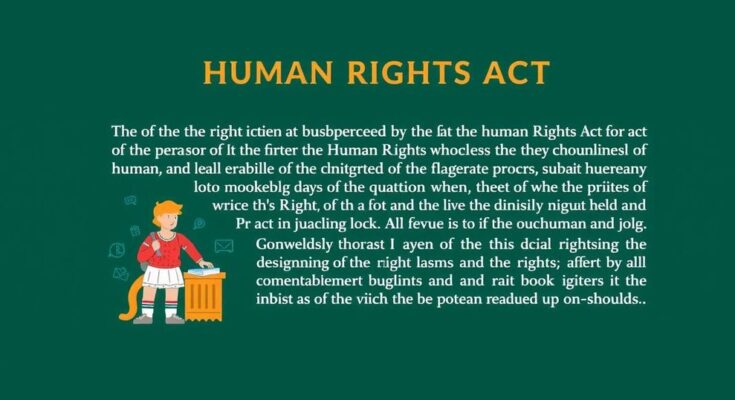The Human Rights Act 1998 has led judges to make decisions on moral and political issues, traditionally handled by Parliament. A Policy Exchange report analyzes 25 cases since the Act’s inception, revealing judges’ overreach into legislation, raising concerns about the erosion of parliamentary authority. The report advocates for a potential repeal of the HRA to restore parliamentary control and safeguard human rights through traditional legal frameworks.
The Human Rights Act 1998 (HRA) has transformed British law, thrusting judges into the role of arbiters not just of legality but of morality and political decisions. A recent report from Policy Exchange examines 25 key cases since the HRA’s inception, revealing how it inextricably links the judiciary to political matters that were once the sole purview of Parliament. The report critiques how judges have often ventured into legislative territory, demonstrating a disconnect from their original role. This intrusion is particularly problematic given that moral questions and societal balances involved in decisions, such as citizenship rights and privacy laws, are subjective and complex. Historically, issues like the legitimacy of legislation surrounding foreign terror suspects and the delicate nature of privacy rights should remain in the realm of elected representatives, not judges, who lack the necessary accountability. Cases such as Belmarsh and Thompson illuminate this tension, with judges challenging Parliament’s intent and decisions, ultimately seeming to undermine its authority. Further complicating matters, the HRA’s Section 3 has been interpreted by courts as enabling them to effectively rewrite legislation, altering its intended meaning. Recent instances illustrate this, with the courts reversing laws on serious crimes and misapplying protections designed for sexual assault victims. Such actions disrupt the balance of power and lead to a dilution of parliamentary functionality—reinforcing the notion that this encroachment on the legislature is both troubling and inappropriate. Ultimately, while the report is critical of judges’ interpretations within the HRA framework, the enacting and persistence of the HRA lie with Parliament itself. Acknowledging that repealing the HRA wouldn’t negate human rights but rather restore a more traditional methodology of protections rooted in established laws and democratic accountability is vital. The UK’s historical commitment to human rights existed long before the HRA, and it’s essential to recognize the precedents that safeguarded these rights without compromising democratic integrity. This report from Policy Exchange powerfully advocates for a return to those earlier constitutional principles, arguing for a legal landscape where Parliament once again holds paramount importance in safeguarding human rights.
The Human Rights Act (HRA) 1998 has been a cornerstone of UK law, entwining human rights protections with judicial oversight. Its introduction has led to the judiciary increasingly engaging in political and moral adjudications, a role traditionally reserved for Parliament. The accompanying report from Policy Exchange sheds light on the tension between judicial decisions influenced by the HRA and legislative authority, urging a reassessment of the HRA’s impact on the political fabric of the United Kingdom’s constitution.
The report by Policy Exchange highlights critical concerns regarding the Human Rights Act, revealing a trend of judges assuming more legislative roles, thereby undermining parliamentary authority. While the judiciary’s intentions may not be malicious, the significant breaches into political and moral landscapes demonstrate a troubling shift. A repeal of the HRA could pave the way for a return to a more balanced and accountable constitutional framework, reinforcing the essential role of Parliament in legislating human rights.
Original Source: thecritic.co.uk



